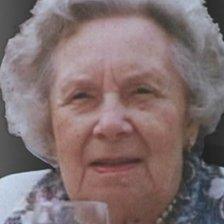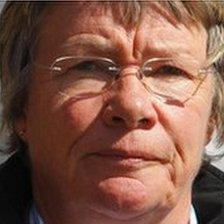Gladys Richards inquest: Painkillers 'contributed to death'
- Published

Gladys Richards, who had dementia, had been living at a nursing home
Painkillers and sedatives given to a 91-year-old woman after a hip operation "more than insignificantly" contributed to her death, a coroner has ruled.
David Horsley gave his narrative verdict at the end of an inquest into the death of Gladys Richards, of Lee-on-the-Solent.
She died in August 1998 at Gosport War Memorial Hospital (GWMH) after being sent there to recover.
He added there were a number of contributing factors including her age.
Mrs Richards was taken to GWMH following a hip operation after a fall.
She had a second fall and had to be transferred to another hospital for treatment before returning to the GWMH.
She then suffered a haematoma and was given diamorphine administered through a syringe driver, and died four days later on 21 August 1998, the hearing was told.
'Extremely disappointing'
Inquests into 10 other deaths at the hospital in 2009 found that drugs were a contributory factor in some cases.
Hampshire Constabulary investigated the deaths of 92 elderly patients at GWMH but no prosecutions have ever been brought.
Mrs Richards' daughters, Gillian Mackenzie and Lesley O'Brien, have campaigned for several years for a full inquest to be held into their mother's death.
Mrs Mackenzie, 79, of Eastbourne, East Sussex, questioned during the inquest whether the medical staff operated a policy of euthanasia and accused the staff of "condemning" her mother to death through the palliative medication prescribed.

Dr Jane Barton resigned from Hampshire NHS Foundation Trust in 2010
Mr Horsley, coroner for Portsmouth and South East Hampshire, ruled the cause of death was bronchopneumonia.
He said other factors which contributed to her death included falls at Glen Heathers Nursing Home, where she lived, and at GWMH, the operations she had undergone at Royal Hospital Haslar, her frailty and end stage dementia.
Mrs O'Brien, a qualified nurse, said the verdict was "extremely disappointing".
"I felt some of the evidence given lent him to only be able to give that verdict," she said.
The seven-day inquest heard that Dr Jane Barton, who was found guilty by the General Medical Council (GMC) of multiple instances of professional misconduct in 2010 but was not struck off, had prescribed levels of diamorphine for the nursing staff to administer in case Mrs Richards' condition deteriorated.
She also wrote on Mrs Richards' patient notes that she was happy for the nursing staff to certify death.
Dr Barton, who has since retired, told the hearing she "proactively prescribed" the medication because "the probability was her condition would deteriorate rather than improve".
She said higher levels of the prescription were only to be used if Mrs Richards' condition deteriorated.
She added she believed Mrs Richards was dying when she returned to the GWMH for the second time and therefore required higher levels of painkillers.
The GMC found a catalogue of failings in Dr Barton's treatment of 12 other patients at the hospital who later died, including issuing drugs which were "excessive, inappropriate and potentially hazardous".
- Published15 April 2013
- Published12 April 2013
- Published11 April 2013
- Published10 April 2013
- Published9 April 2013
- Published18 August 2010